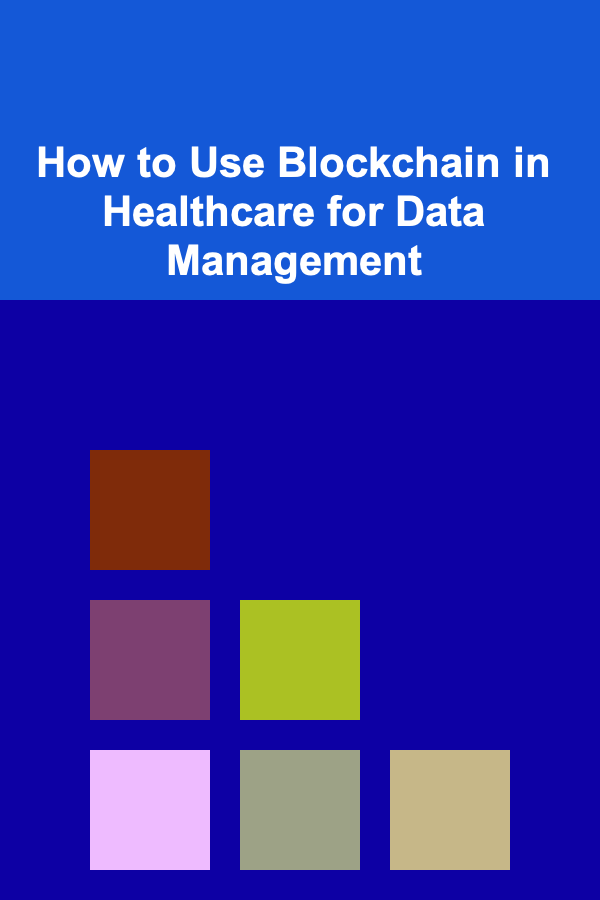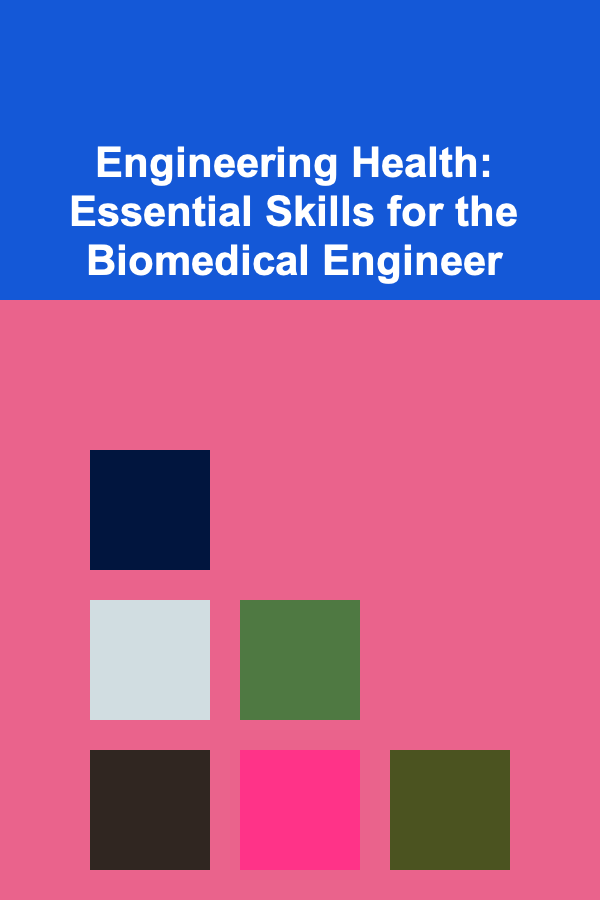
How to Use Blockchain in Healthcare for Data Management
ebook include PDF & Audio bundle (Micro Guide)
$12.99$5.99
Limited Time Offer! Order within the next:

In the modern world, healthcare data management is critical, as the volume of patient information grows exponentially with the digitalization of healthcare systems. From electronic health records (EHRs) to laboratory results, patient data needs to be stored securely and shared efficiently across various systems and institutions. However, the traditional ways of managing healthcare data often come with challenges like data breaches, fragmentation, and slow processes.
Blockchain technology, originally developed for cryptocurrency, offers a promising solution to many of these issues. By utilizing blockchain in healthcare data management, we can ensure the security, integrity, and accessibility of health data in a more transparent and efficient manner. This article will explore how blockchain can be integrated into healthcare for data management, addressing the challenges it solves, its potential benefits, and the hurdles that still need to be overcome.
Understanding Blockchain Technology
At its core, blockchain is a decentralized ledger technology that securely records transactions across a network of computers. Each "block" in the chain contains a set of transactions, and these blocks are linked in a chronological order. The data is stored across a network of nodes (computers), which ensures that it cannot be altered or deleted without the consensus of the majority. This immutability and transparency make blockchain a powerful tool for securing and sharing sensitive information, such as healthcare data.
In a healthcare setting, blockchain could be used to record and manage various types of medical information, including patient records, prescriptions, diagnostic results, and more. By leveraging blockchain, healthcare providers can create a more secure, efficient, and patient-centered approach to data management.
The Challenges of Traditional Healthcare Data Management
Before diving into how blockchain can address these challenges, it's important to understand the existing issues with traditional healthcare data management systems.
1. Data Security and Privacy Concerns
Healthcare data is extremely sensitive, and breaches can have severe consequences for patients, including identity theft and fraud. Hospitals and healthcare providers often store patient data in centralized databases that are vulnerable to cyberattacks, making it a target for hackers. In addition, regulatory requirements such as the Health Insurance Portability and Accountability Act (HIPAA) in the United States add complexity to data management, as healthcare providers must ensure patient data is kept private and secure.
2. Fragmentation of Data
Healthcare data is often fragmented across multiple platforms and institutions. For instance, a patient might have their primary care provider, specialist, laboratory, and pharmacy all maintaining separate records. This fragmented approach can lead to discrepancies and inefficiencies in treatment, as healthcare providers may not have access to the complete patient history.
3. Slow Data Sharing and Interoperability
The healthcare industry relies on data sharing to ensure timely and effective treatment. However, many healthcare systems use proprietary software that doesn't communicate well with other systems, leading to delays in sharing data. A slow data-sharing process can be detrimental to patient care, especially in emergency situations where rapid access to medical history is crucial.
4. Lack of Transparency
In healthcare, the ownership and control of patient data can be unclear. Patients often have limited visibility into how their data is being used and shared, which can lead to distrust. Healthcare providers, on the other hand, may struggle with verifying the authenticity and completeness of data provided by patients or other institutions.
How Blockchain Can Address These Challenges
Blockchain offers several features that can address the challenges of healthcare data management, including decentralization, immutability, and transparency. Let's explore how these features can be applied to healthcare.
1. Enhanced Security and Privacy
One of the primary concerns in healthcare is the security and privacy of patient data. Blockchain can provide a high level of security by decentralizing the data storage. Since the data is distributed across multiple nodes and protected by cryptographic techniques, it is much harder for hackers to alter or steal it. Even if a hacker compromises one node, they would need to manipulate the entire network to alter the data, which is nearly impossible in a well-designed blockchain system.
Additionally, blockchain can help ensure patient privacy by giving patients more control over their data. With blockchain, patients can grant permission to healthcare providers to access their data and revoke access when they choose. This provides a more patient-centered approach to data privacy, aligning with privacy laws like HIPAA.
2. Improved Data Integrity
Blockchain ensures the integrity of healthcare data through its immutability feature. Once data is recorded in a blockchain, it cannot be modified or deleted without the consent of the network. This feature is particularly important in healthcare, where maintaining accurate and complete patient records is critical.
For example, a patient's medical history, including diagnoses, treatments, and prescriptions, can be securely recorded on the blockchain. Any updates to this data (such as new prescriptions or test results) would create a new block, ensuring a complete and accurate record. This provides an immutable and auditable trail of all changes made to the patient's data, which can be useful for medical professionals and regulatory authorities.
3. Streamlined Data Sharing and Interoperability
Blockchain can facilitate secure and seamless data sharing between different healthcare providers. By using a decentralized ledger, healthcare institutions can access and update patient records in real-time, without needing to rely on centralized databases. This eliminates the issue of fragmented data and ensures that all healthcare providers have access to the most up-to-date and accurate information.
Furthermore, blockchain can help with interoperability between different healthcare systems. Since the data is stored on a shared, decentralized ledger, different systems can access the data using standard protocols. This means that a patient's health information could be easily shared between their primary care provider, specialists, pharmacies, and other relevant entities, leading to more coordinated and efficient care.
4. Transparency and Patient Control
Blockchain's transparency ensures that all parties involved in a patient's care can see a complete and auditable history of their data. This increases accountability and reduces the likelihood of fraud or errors. Patients also benefit from blockchain's transparency by gaining more control over their own data. They can view who has accessed their records and authorize or revoke permissions as needed.
In this model, patients become the owners of their health data, and healthcare providers act as intermediaries who facilitate access to that data. This approach can foster trust and improve the relationship between patients and healthcare providers, as patients have more control over how their information is used.
Real-World Applications of Blockchain in Healthcare
Several initiatives are already exploring the use of blockchain in healthcare data management. Let's look at a few examples of how blockchain is being applied in the healthcare sector.
1. Electronic Health Records (EHRs)
The management of electronic health records (EHRs) is one of the most promising applications of blockchain in healthcare. By using blockchain, healthcare providers can create a secure, immutable, and decentralized EHR system that is accessible to all authorized parties. This would ensure that patient records are accurate, complete, and up-to-date, while also reducing the risks of data breaches and cyberattacks.
A blockchain-based EHR system could allow patients to control who has access to their health data. They could grant permission to different healthcare providers to view their records as needed, without the need for a third-party intermediary. This would streamline the process of accessing patient information and improve the coordination of care across different healthcare providers.
2. Supply Chain Management for Pharmaceuticals
Blockchain can also be used to improve the transparency and security of the pharmaceutical supply chain. By recording every transaction in the supply chain on a blockchain, stakeholders can track the movement of drugs from manufacturer to distributor to pharmacy. This can help prevent the distribution of counterfeit drugs, which is a major issue in global healthcare.
Blockchain can also improve the efficiency of drug recalls. If a pharmaceutical product is found to be defective or harmful, the recall process can be sped up by using a blockchain-based system to identify the affected batches and quickly notify all relevant parties.
3. Clinical Trials and Research
Clinical trials are another area where blockchain can make a significant impact. Blockchain can be used to ensure the integrity of clinical trial data by providing a transparent and immutable record of all trials and results. This would help eliminate the risk of data manipulation or fraud in clinical research and ensure that the results are accurate and trustworthy.
Furthermore, blockchain can facilitate collaboration between researchers by providing a secure and transparent platform for sharing data. Researchers can access and contribute to clinical trial data while maintaining the confidentiality and integrity of the information.
4. Telemedicine and Remote Patient Monitoring
With the rise of telemedicine and remote patient monitoring, blockchain can be used to secure the data exchanged between patients and healthcare providers. By using blockchain, telemedicine platforms can ensure that patient information remains secure and that only authorized individuals can access it. Blockchain can also help ensure that the data collected from remote monitoring devices is accurate and tamper-proof.
Challenges and Limitations of Blockchain in Healthcare
While the potential of blockchain in healthcare is immense, there are still several challenges and limitations that need to be addressed.
1. Regulatory and Legal Issues
The use of blockchain in healthcare is subject to strict regulatory requirements, such as HIPAA in the U.S. and the GDPR in Europe. Blockchain's decentralized nature can make it difficult to comply with these regulations, as it may not be clear who is responsible for the data or who can access it. Regulatory authorities will need to develop new guidelines to address these challenges and ensure that blockchain solutions comply with existing laws.
2. Scalability and Cost
Blockchain networks can face scalability issues when handling large volumes of data, which is a common challenge in healthcare. The high computational power required to process and store blockchain transactions can also make it expensive to implement. These challenges may limit the widespread adoption of blockchain in healthcare unless solutions are developed to make blockchain more scalable and cost-effective.
3. Integration with Existing Systems
Integrating blockchain with existing healthcare systems and databases can be complex and time-consuming. Many healthcare institutions still rely on legacy systems that may not be compatible with blockchain. Overcoming these integration challenges will be essential for the successful implementation of blockchain-based healthcare solutions.
4. Patient Adoption and Trust
While blockchain offers many benefits, patients may be hesitant to adopt blockchain-based healthcare solutions due to concerns about privacy, security, and usability. Education and awareness campaigns will be needed to build trust in blockchain technologies and encourage patients to embrace them.
Conclusion
Blockchain has the potential to revolutionize healthcare data management by providing secure, transparent, and efficient solutions to some of the industry's most pressing challenges. From enhancing data security and privacy to improving interoperability and data sharing, blockchain can address many of the issues that hinder healthcare systems today. However, challenges such as regulatory compliance, scalability, and integration with existing systems must be overcome before blockchain can achieve widespread adoption in healthcare.
As healthcare systems continue to evolve, the adoption of blockchain technology will likely become a key step toward creating a more secure, patient-centered, and efficient healthcare ecosystem.
Reading More From Our Other Websites
- [Home Party Planning 101] How to Plan a Home Party for a Small Space: Maximizing Comfort and Style
- [Home Storage Solution 101] How to Implement Hanging Storage Ideas for Efficient Use of Vertical Space
- [Organization Tip 101] How to Organize Digital Fitness Resources and Apps
- [Personal Financial Planning 101] How to Create a Personalized Budget That Works for You
- [Personal Investment 101] Leveraging Deep Learning to Build a Successful Passive Income Portfolio
- [Organization Tip 101] How to Use a Weekly Planner for Household Management
- [Home Holiday Decoration 101] How to Create a Cozy Holiday Atmosphere with Holiday Lanterns
- [Reading Habit Tip 101] Morning Page-Turners: How Top CEOs Kick-Start Their Day with Reading
- [Personal Care Tips 101] How to Use Toothpaste to Prevent and Soothe Gum Inflammation
- [Hiking with Kids Tip 101] Singing in the Storm: Fun Games and Activities to Keep Kids Engaged on Rainy Hikes

Engineering Health: Essential Skills for the Biomedical Engineer
Read More
Global Market Analysis: A Comprehensive Guide for Market Research Analysts
Read More
How to Make Your Home Smell Like the Holidays
Read More
How to Use Security Signs and Stickers to Deter Criminals
Read More
How to Use Thrifted Finds to Create a Unique Home Design
Read More
How to Invest in Stocks
Read MoreOther Products

Engineering Health: Essential Skills for the Biomedical Engineer
Read More
Global Market Analysis: A Comprehensive Guide for Market Research Analysts
Read More
How to Make Your Home Smell Like the Holidays
Read More
How to Use Security Signs and Stickers to Deter Criminals
Read More
How to Use Thrifted Finds to Create a Unique Home Design
Read More